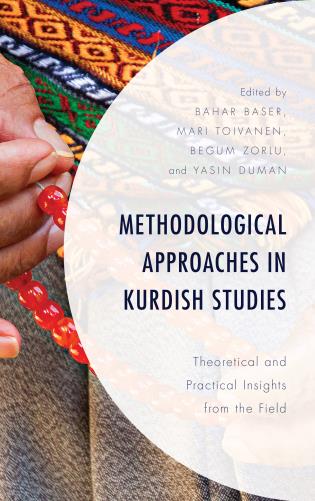Anderson, Benedict. 1983. Imagined Communities: Reflections on the Origin and Spread of Nationalism. London: Verso.
Baser, Bahar. 2011. Kurdish Diaspora Political Activism in Europe with a Particular Focus on Great Britain: Diaspora Dialogues for Development and Peace Project. Berlin: Berghof Peace Support.
Baser, Bahar, and Mari Toivanen. 2018. “Politicized and depoliticized ethnicities, power relations and temporality: Insights to outsider research from comparative and transnational fieldwork.” Ethnic and Racial Studies 41, no. 11: 2067–2084. doi: 10.1080/01419870.2017.1348530.
Breen, J. Lauren. 2007. “The researcher ‘in the middle’: Negotiating the insider/ outsider dichotomy.” Australian Community Psychologist 19, no. 1:163–174.
Brubaker, Rogers, and Frederick Cooper. 2000. “Beyond Identity.” Theory and Society 29: 1–47.
Buchanan, Ian. 2010. Dictionary of Critical Theory. Oxford: Oxford University Press.
Chaliand, Gérard. 1994. The Kurdish Tragedy. London: Zed Books.
Cohen, Robin. 2001. Global Diasporas: An Introduction. London: Routledge.
De los Reyes, Paulina. 2002. “Den svenska jämställdhetens etniska gränser – ompatriarkala enklaver och kulturella frizoner.” In Det slutna folkhemmet: om etniskaklyftor och blågul självbild, edited by Ingemar Lindberg and Magnus Dahlstedt, 172–187. Stockholm: Agora.
Fabian, Johannes. 1983. Time and the Other: How Anthropology Makes Its Object. New York: Columbia University Press.
Gajjala, Radhika. 2008. “South Asian Technospaces and ‘Indian’ Digital Diasporas?” In South-Asian Technospaces, edited by Radhika Gajjala and Venkataramana Gajjala, 37–48. New York: Peter Lang, Digital Formation Series.
Geertz, Clifford. 1973. Thick Description: Towards an Interpretive Theory of Culture; Selected Essays. New York: Basic Books.
Glick-Schiller, Basch Linda Nina, and Cristina Blanc-Szanton. 1992. Towards a Transnational Perspective on Migration: Race, Class, Ethnicity, and Nationalism Reconsidered. New York: New York Academy of Sciences.
Greenbank, Paul. 2003. “The role of values in educational research: the case for reflexivity.” British Educational Research Journal 26, no. 6:791–801.
Hall, Stuart. 1998. “Introduction: Who needs identity?” In Questions of Cultural Identity, edited by Stuart Hall and Paul du Day, 1–17. London: Sage.
Hammersley, Martyn. 2003. “Conversation analysis and discourse analysis: methods or paradigms?” Discourses and Society 14 (November): 751–781.
Hassanpour, Amir. 1992. Nationalism and Language in Kurdistan 1918–1985. San Francisco: Mellen Research University Press.
Hodkinson, Paul. 2005. “‘Insider research’ in the study of youth cultures.” Journal of Youth Studies 8, no. 2: 131–149.
Ignacio, Emily. 2005. Building Diaspora: Filipino Cultural Community Formation on the Internet. New Brunswick, NJ: Rutgers University Press.
Ignacio, N. Emily. 2012. “Online Methods and Analyzing Knowledge-Production: A Cautionary Tale.” Qualitative Inquiry 18: 237–246.
Karim, H. Karim. 2006. “Nation and diaspora: Rethinking multiculturalism in a transnational context.” International Journal of Media and Cultural Politics 2, no. 3: 267–282.
Kuntsman, Adi. 2009. Figurations of Violence and Belonging: Queerness, Migranthood and Nationalism in Cyberspace and Beyond. London: Peter Lang.
Labaree, V. Robert. 2002. “The risk of ‘going observationalist’: Negotiating the hidden dilemmas of being an insider participant observer.” Qualitative Research 2, no. 1: 97–122.
Mahmod, Jowan. 2016. Kurdish Diaspora Online: From Imagined Community to Managing Communities. New York: Palgrave Macmillan.
McDowall, David. 2004. A Modern History of the Kurds. London: I.B. Tauris.
Merriam, B. Sharan, Juanita Johnson-Bailey, Ming-Yeh Lee, Youngwha Kee, Gabo Ntseane, and Mazanah Muhamad. 2001. “Power and positionality: Negotiating insider/outsider status within and across cultures.” International Journal of Lifelong Education 20, no. 5: 405–416.
Paechter, Carrie. 2013. “Researching sensitive issues online: Implications of a hybrid insider/outsider position in a retrospective ethnographic study.” Qualitative Research 13, no. 1: 71–86.
Ratner, Carl. 2002. “Subjectivity and objectivity in qualitative methodology.” Qualitative Social Research 3, no. 3.
Rybas, Natalia, and Radhika Gajjala. 2007. “Developing cyberethnographic research methods for understanding digitally mediated identities.” Forum: Qualitative Social Research 8, no. 3.
Shani, Orgad. 2009. “How can researchers make sense of the issues involved in collecting and interpreting online and offline data?” In Internet Inquiry: Conversations about Method, edited by Annette N. Markham and Baym K. Nancy, 33–53. Los Angeles: Sage.
Van Maanen, John. 2011. Tales of the Field: On Writing Ethnography. Chicago and London: The University of Chicago Press.
Visweswaran, Kamala. 1997. Fictions of Feminist Ethnography. Minnesota: University of Minnesota Press.
Wellington, Jerry, Ann-Marie Bathmaker, Cheryl Hunt, Gary McCulloch, and Pat Sikes. 2005. Succeeding with your Doctorate. London: Sage.

